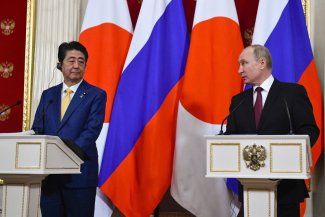Russia/Japan: slim chances for a peace treaty

Japanese Prime Minister Shinzō Abe’s efforts since 2013 to resolve the territorial dispute with Russia over the Kuril Islands, and as a consequence to sign a peace treaty, have not led to a breakthrough, and are unlikely to succeed. Abe assumed that he could persuade Russia to make territorial concessions by cultivating a personal relationship with Vladimir Putin and offering to deepen the two countries’ economic cooperation. Abe also clearly appeared ready to make a compromise whereby Japan would regain just two of the four disputed islands. Russia, taking advantage of the Japanese prime minister’s determination to reach an agreement, has been pushing hard to extract maximum economic and geopolitical benefits, but it is doubtful that it is prepared to reciprocate by making any territorial concessions.
Disappointing results of the Moscow summit
PM Abe’s talks with Putin in Moscow on January 22 brought no visible progress towards the conclusion of a peace treaty between Russia and Japan, or towards the settlement of the territorial dispute over the Southern Kuril Islands. At the press conference after the talks, President Putin hinted that Russia expects Japan to become more economically involved in Russia, particularly by increasing its investments. At the same time, he remained non-committal on the territorial issue. The results of the summit confirmed the impression from last week’s meeting between the two countries’ foreign ministers: despite the Japanese prime minister’s openly expressed hopes, a rapid agreement should not be expected, and it is not even sure that any such agreement is possible.
Japanese efforts
Prime Minister Shinzō Abe arrived in Moscow to continue negotiations on the signing of a peace treaty between Russia and Japan, which were formally initiated during the Japanese foreign minister’s recent (14 January) visit and thus to bring a resolution to the territorial dispute, ongoing since the end of World War II, over four islands at the southern end of the Kuril Islands (the Southern Kurils, also known according to official Japanese terminology as the Northern Territories). Prime Minister Abe began his intensive efforts to overcome the deadlock, which in this case has been ongoing for more than 50 years, as early as 2013by signalling to Russia that he is ready to come to a compromise solution and offering Moscow economic benefits. In May 2016 he proposed an eight-point programme on economic and technical cooperation intended to demonstrate Japan’s goodwill and readiness for a rapprochement between the two countries and societies. During Putin’s visit to Tokyo in December 2016, Russian and Japanese companies signed more than 80 agreements on economic cooperation. Although most of them were non-binding memoranda, two Russian companies (Novatek and Gazprom) received Japanese loans worth a total of US$1 billion; a joint Japanese-Russian investment fund worth a further US$1 billion was also created. In a kind of payback, Russia agreed to consider the possibility of Japanese companies participating in economic projects on the Kuril Islands, and to make it easier for former residents to visit the graves of their ancestors.
Prime Minister Abe’s efforts to regulate relations with Russia have two causes. The first is geopolitical: Abe believes that the growing power and assertiveness of China requires the removal of any disputes between Japan and Russia, and that attempts must be made to strengthen their relations in all spheres (economic, political, military) to prevent any further rapprochement between Moscow and Beijing, especially a situation whereby Russia becomes dependent on China. The second is prestige: Abe wants to go down in history as the statesman who has achieved the dual success of finally signing a peace treaty with Russia and arranging a return of part of the disputed territory.
When further negotiations stalled after two years of intense efforts, the implementation of the ‘eight points’ programme and numerous summit meetings (the parties have not even been able to agree on the legal framework for economic cooperation in the Southern Kurils which was announced in 2016), Prime Minister Abe made some quite far-reaching concessions. During the East Asian summit in Singapore in November 2018 he made it clear that he was prepared to accept the Russian position, as declared by Putin, that further negotiations should be based on the Japanese-Soviet declaration of 1956. This declaration stated that Moscow would hand over to Japan two of the four disputed islands (Shikotan and the Habomai group, representing about 8% of the disputed area) after Japan has signed a peace treaty. This was a significant change in Japan’s position, as previously Tokyo had demanded the return of all four islands, making the signing of the peace treaty with Russia conditional on such a step. Moreover, according to the Asahi Shimbun newspaper, Abe promised that Japan would not allow American military personnel to be stationed on the recovered islands. After the meeting at the G-20 Summit in Buenos Aires in December 2018, Abe and Putin announced the formal launch of direct peace treaty negotiations at the foreign minister level. Before the recent talks in Moscow, the Japanese prime minister declared that his goal was to sign a peace treaty before the end of 2019.
Russian ambitions
The Russian side signalled its willingness to compromise, but as Abe began to demonstrate his determination to bring about the signing of the treaty, Moscow began to escalate its terms on the possible handover of the two islands to Japan. These terms are not limited to the intensification of Japanese involvement in economic cooperation with Russia (in particular, a significant increase in Japanese investments), but also have a political character. The Russian side, particularly Foreign Minister Sergei Lavrov, has claimed that Japan has not yet done enough to create a sufficiently favourable atmosphere for the resolution of the territorial dispute. Moscow pointed to Japan’s participation in Western sanctions and its cooperation with the United States on missile defence (the Japanese missile defence system intended to protect the country against attack by North Korea is equipped with ship-based Aegis SM-3 & land-based Patriot PAC-3 missiles, and uses American detection systems, while elements of the US ballistic missile defence system are located on the Japanese islands; two land-based missile defence bases are scheduled for deployment in Japan by 2023). In addition, Lavrov accused Japan of supporting UN resolutions targeted against Russia, and of coordinating its stance in the G-20 in advance with the Western powers within the framework of the G-7.
It follows from this that Russia is making the conclusion of the treaty conditional on Japan withdrawing from the Western sanctions, ending or limiting its cooperation with the US in the area of missile defence, and loosening the ties between Japan and the US in the sphere of security, as well as expecting Japan to conduct a foreign policy ‘more independent’ of the US. Moscow has also hinted that it expects a guarantee that in case it hands over the disputed islands, Japan will not allow US military installations on them. Recently, Putin and Lavrov have begun to emphasise the need for Japan to recognise ‘the results of World War II’, i.e. Russian sovereignty over the disputed islands. It seems that the formula Moscow is proposing would be based on Russia, after extracting an economic price from Japan, transferring the two islands to Japanese administration but without formally renouncing its sovereignty over them.
Little chance of agreement
It is doubtful that Prime Minister Abe will succeed in reaching an agreement with Russia on the issue of the peace treaty. Firstly, it is difficult to assess whether Japan’s political establishment and public are ready to follow Prime Minister Abe and give up the claim to all four islands. Secondly, it is not known how inflexible Russians will be on the missile defence issue: if Japan withdrawing its cooperation with the US in this field turns out to be a sine qua non for them, Tokyo will rather give up the peace treaty. It seems equally unlikely that it will accept the Russian demands for Japan to loosen ties with the United States. Thirdly, it seems that Moscow’s goal is to use Prime Minister Abe’s ambition to sign a peace treaty to extract the maximum economic (Japanese investment, increased trade) and political concessions (the loosening of the Japanese-American alliance) from him, without Russia being ready to give up possession of even two of the islands. Another factor reducing the likelihood that Moscow will be ready for any territorial concessions is the present domestic situation in Russia. In view of the population’s deteriorating financial situation, economic stagnation and the historically low rates of Putin’s popularity, the Kremlin will not want to take any decisions that could be perceived by Russian society and its elites as ‘unpatriotic’.




